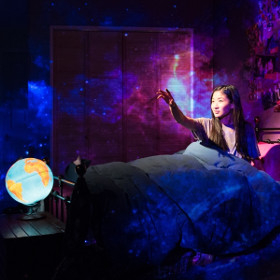Hannah (Unicorn Theatre)

With pink bedclothes, boy band posters and piles of clutter, the set of Hannah could be any of the girls in the audience’s bedroom. However within the 75-minute production, the audience follows Hannah as she plucks a star from the sky, talks to a philosophical turtle and creates war across several continents. A not-so-normal teenager after all, faced with an impossible question – what would you do for good if you had all the power in the world?
A modern-day adaption of Christopher Marlowe’s posthumous Doctor Faustus, Chris Thorpe's Hannah focuses on the depths a girl will sink to in the quest to stop her isolation. The protagonist is left alone after her mother goes to work, where she focuses her energy on saving the world from global warming, and in a moment of desperation Hannah cries out that she would give anything to become the centre of the world. Enter Dave – once her pet lizard and now a flesh and blood demon – who offers to grant Hannah the power to control the universe in any way she likes for the small price of her soul.
The dark events that unfold, from creating a ‘friend’ to the end of humanity, lead to a moment of realisation for the young girl. When the world is laid out on her bedroom floor, she has no choice but to take a step back and realise that her mum was right when she tried to explain the importance of being connected with other people on the planet.
The set is flawlessly assembled with innovative lighting, designed by David W Kidd, creating a desert island ocean, a continent at war and a barren planet on a bare floor.
The performances are varied with Ian Keir Attard, Dave the demon, giving the most impressive performance, seamlessly switching from every-man mode to poisonous influencer and clocking the most laughs. Kae Alexander, as Hannah, captures the young girl’s restless spirit with an energetic rendition, yet sadly the relationship between mother and daughter isn’t convincing due to the lack of maternal quality in Irma Innis’ performance.
Writer Chris Thorpe‘s message isn’t subtle – ‘you can’t wish the suffering away’, the chorus tells the audience in the conclusion – but trying to understand the world as others see it can be a comfort in times of pain. For ages 11+, the subject is heavy, the dialogue is dense and the message may be lost on younger audience members. However, empathy is an important lesson for all ages and parents will be grateful if their children take the message on-board.










